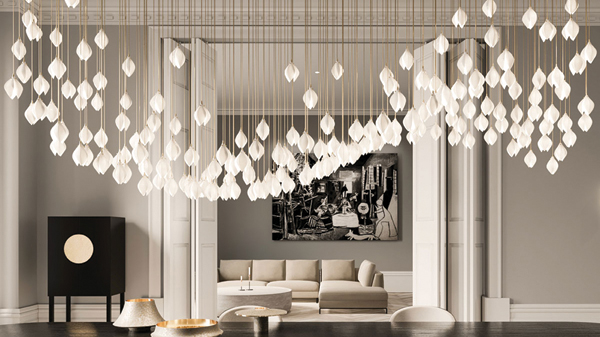
Modern light designs to transform any room
Lighting is a defining element of any home. It lends a flattering illumination to enhance the ambiance and the practicality of a space, while elevating the overall aesthetic. The most stunningly lit rooms are the result of careful planning rather than happenstance, so bear the following points in mind before selecting any new fixtures for your home.

Without a shadow of a doubt, the style, material and finish of your lights are all crucial. Homeowners should always pick a fixture that speaks to them, echoing their style and taste. However, the size of a light installation can just as easily make or break the desired aesthetic, so this is the first factor to consider when planning the lighting of each room.
Entrance and Living Room
Start from the entryway, which in most Hong Kong homes leads into the living room, the area reserved for entertainment and relaxation. The lighting here sets the tone for the rest of the home. As the largest room in the house, the living area is also the most difficult in which to compose a perfect ratio of light fixture size, height and proportion. A gorgeous statement piece like a chandelier, for example, works best on a high ceiling – instantly filling the space while adding a beautiful contrast to the height. Chandeliers between 22 and 26 inches in diameter are a good size for ceilings of 10 to 11 feet, while ceilings that reach 12 feet or more can be filled by grandiose fixtures that are at least 30 inches in diameter – anything smaller may cheapen the aesthetic of the space.
However, if height is an issue, recessed lights, which are pushed neatly into the ceiling, or open soffit lights nestled into dropped ceilings or at the top of walls, pillars and beams, offer clear, soft and unobtrusive ambient light, even offering the illusion of a higher ceiling.
For something more dramatic, instead of lining the edges of the ceiling with recessed lights, create a circular tray above the main area to hide away LED lights for a unique halo effect. For art aficionados, adding layers of multiple light sources will create the illusion of depth in a room, delivering beautifully lit spaces that showcase the various elements, such as a chandelier complemented by a task light and a decorative accent light as an ambiance booster.

Dining Room
Just because the dining room serves a more practical purpose than the living room, illumination here should not be limited to a series of task lights. It is important that this space is bright enough for guests to be comfortable while chatting and eating at the dining table. Though small-scale chandeliers can feature here, it is pendant lights that instantly dress the room. They also provide an anchor for the table, which immediately draws attention. Pendant lights are typically low hanging; suspending them 30 to 36 inches above the table will add character to the space while not obstructing movement.
If your taste leans more towards statement pieces, bold, reflective and crystalised fixtures will effortlessly convey this, while traditional styles feature fabric shades and crystals. In contrast, a modern look is best achieved with clean, simple lines and an emphasis on glass materials. For a mid-century modern vibe, select lighting that features bubble glass; a bubble-glass chandelier or pendant light leaves a lasting impression and creates an outstanding room.
Kitchen
Pendant light fixtures also fit happily in a kitchen. This is the one place in your home where you want ample lighting, especially while working over the kitchen island. Ideally, aligning these lights along the length of the island will bring an illuminated balance to the space. For counters that are six feet or longer, two to three pendant lights will fit right, while a series of sconce or ceiling-mounted lights work well to illuminate other areas, such as the sink.
Hall and Bathroom
The narrow passageways of foyers and halls don’t usually offer much space for lighting. Mounting sconce lights along the walls is the most obvious solution here. However, if more subtle and seamless transition from one room to the next is desired, hidden light sources in the form of hidden lights lining the wall edges will be ideal. This is also true in the bathroom, an area of the house where light is absolutely necessary for daily grooming regimens. Sconces flanking the mirrors, or bright LED lights above them, are the key focal points.
Bedroom
Turning to the more intimate areas of the home, the master bedroom is probably the most revealing space and most telling of its occupants, which is all the more reason to spruce it up with statement lighting. The installations here draw the gaze to the elements that are most important to you. But there are no hard-set rules that must be followed. Placing warm task lights at the bedside is the most popular way to facilitate reading or watching TV shows. Some people, though, prefer to highlight the bed with a big crystal chandelier, or set mood lighting to create a cosier bedchamber.
Having reviewed different lighting solutions and fixture styles and, all importantly, determining the size and brightness required to complement each available space, homeowners can head into their renovation with confidence.
Photos Credit: Design Link, Archetypal, Viz Design













